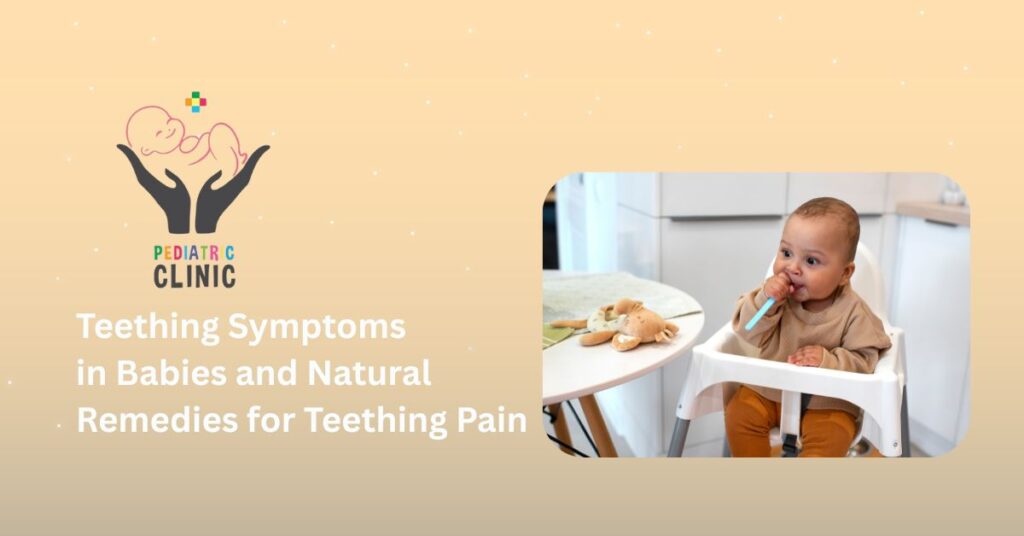Understanding Teething in Babies: A Crucial Milestone
Teething in babies is a significant developmental phase where the first set of teeth begin to emerge through the gums. Typically, teething symptoms in babies start between 4 to 7 months of age, although the timeline can vary. This natural process often leads to discomfort, which can leave many parents concerned about how to soothe their baby during this time.
Parents frequently search for teething remedies for babies because symptoms like irritability, gum swelling, and sleep disturbances can be distressing for both the child and the caregiver. Understanding the early signs and effective home remedies for teething pain is essential for comfort and care.
Common Teething Symptoms in Babies: What to Watch For
Recognizing the early symptoms of teething in babies helps in addressing discomfort before it escalates. Here are the most commonly observed signs:
1. Excessive Drooling
A noticeable increase in drooling is among the first signs of teething in infants. The constant saliva flow may lead to mild facial rashes if not wiped regularly.
2. Swollen or Tender Gums
Swollen gums in babies are a classic indicator of emerging teeth. A baby may respond by chewing on toys or fingers to apply counterpressure.
3. Irritability or Fussiness
Due to gum discomfort, a baby may become unusually cranky. This behavior is often intensified during night-time.
4. Disrupted Sleep
Sleep disturbances during teething are common, as gum pain can interfere with normal sleep patterns.
5. Loss of Appetite
Babies may refuse milk or solids due to the pain associated with sucking or chewing.
6. Chewing on Objects
The instinct to bite helps relieve gum pressure, prompting babies to chew on anything within reach.
If symptoms escalate beyond these signs—such as high fever, vomiting, or persistent diarrhea—it is essential to consult your pediatrician, as these are not normal teething symptoms.
Natural Remedies for Teething Pain in Babies
There are several natural teething remedies for babies that can safely provide relief. These methods are simple, home-based, and recommended by pediatric experts to reduce discomfort during this crucial developmental stage.
1. Cold Compress for Gums
Using a chilled, soft cloth or teething ring can numb the area and reduce swelling. Avoid frozen objects, as they can damage delicate gum tissue.
2. Gum Massage
Clean hands and a light circular massage on the gums can reduce tension. This technique is one of the most recommended home remedies for teething in infants.
3. Chilled Foods (For 6+ Month Babies)
Cold mashed fruits like banana or chilled yogurt can provide dual benefits — soothing the gums and adding nutritional value.
4. Increased Cuddling and Soothing
Holding your baby and maintaining skin-to-skin contact can help comfort them during teething pain in infants.
5. Silicone Teethers
Choose BPA-free silicone teethers that are safe for babies and designed specifically to ease teething symptoms naturally.
Teething Do’s and Don’ts Every Parent Must Know
While addressing teething issues in babies, it’s equally important to be aware of what not to do:
- Avoid over-the-counter numbing gels unless prescribed by a doctor.
- Never use frozen objects or metal spoons to relieve gum pain.
- Do not offer hard vegetables or unsafe objects as teethers.
- Monitor for any allergic reactions to teething toys or foods.
Parents must remain observant during the teething phase and stick to pediatrician-recommended methods.
When to Visit a Pediatrician for Teething-Related Issues
In most cases, teething in babies can be managed at home with natural remedies and comfort. However, you should seek pediatric care if:
- Your baby has a fever over 100.4°F (38°C)
- There’s visible bleeding from the gums
- Your child shows signs of severe discomfort or refuses to eat for more than 24 hours
- Diarrhea or rashes are accompanied by other symptoms
Professional evaluation ensures there are no underlying issues mistaken as teething.
Final Thoughts: Managing Teething Discomfort Effectively
Teething is a natural part of your child’s growth, but understanding the signs of teething in babies and knowing how to provide relief can make the journey smoother. Relying on safe, natural remedies for teething pain helps maintain comfort without compromising health.
At the Pediatric Newborn Clinic, we support every stage of your child’s development with expert guidance and personalized care. For persistent teething concerns or related health issues, consult our pediatric team for advice tailored to your child’s needs.



